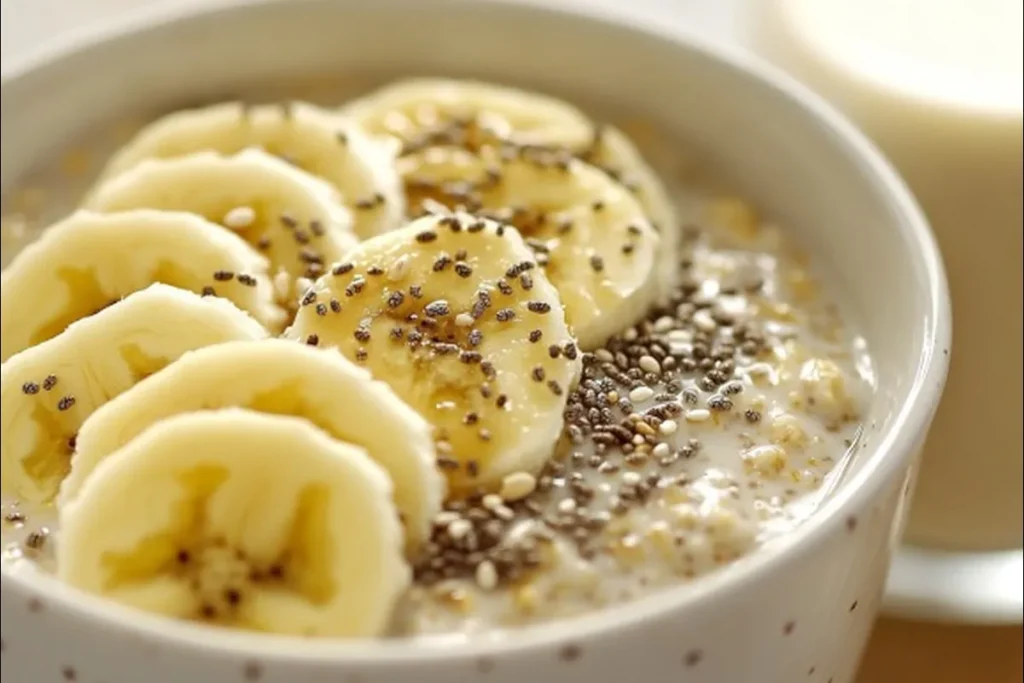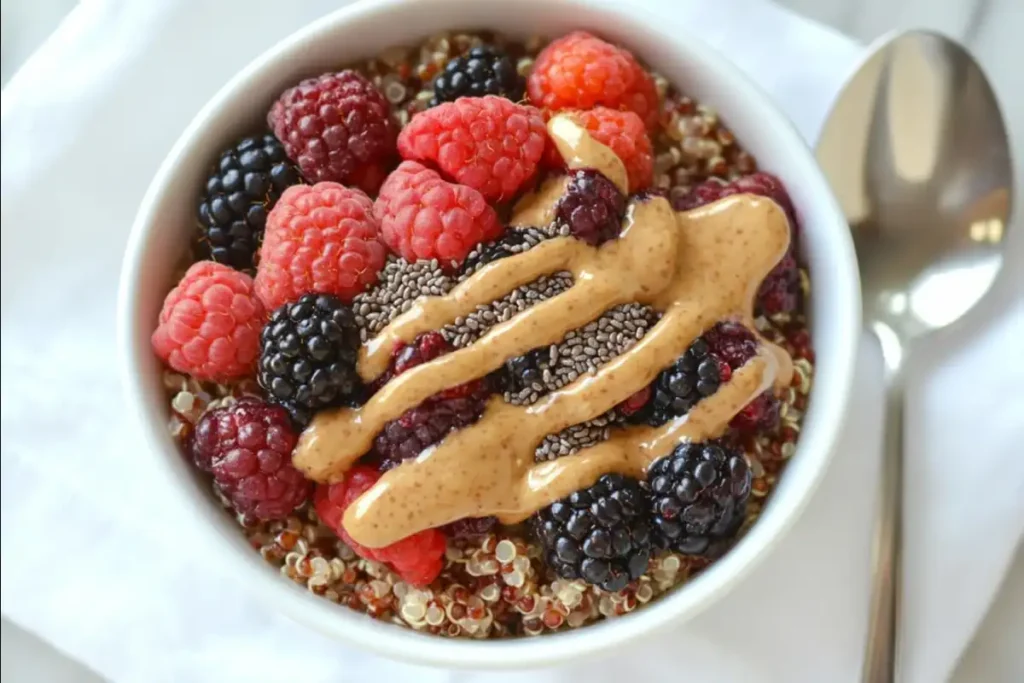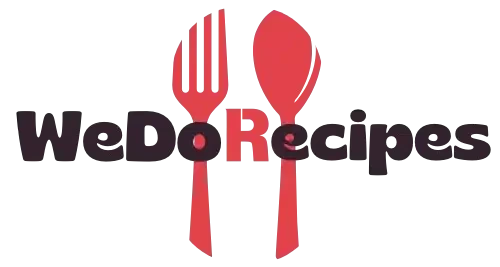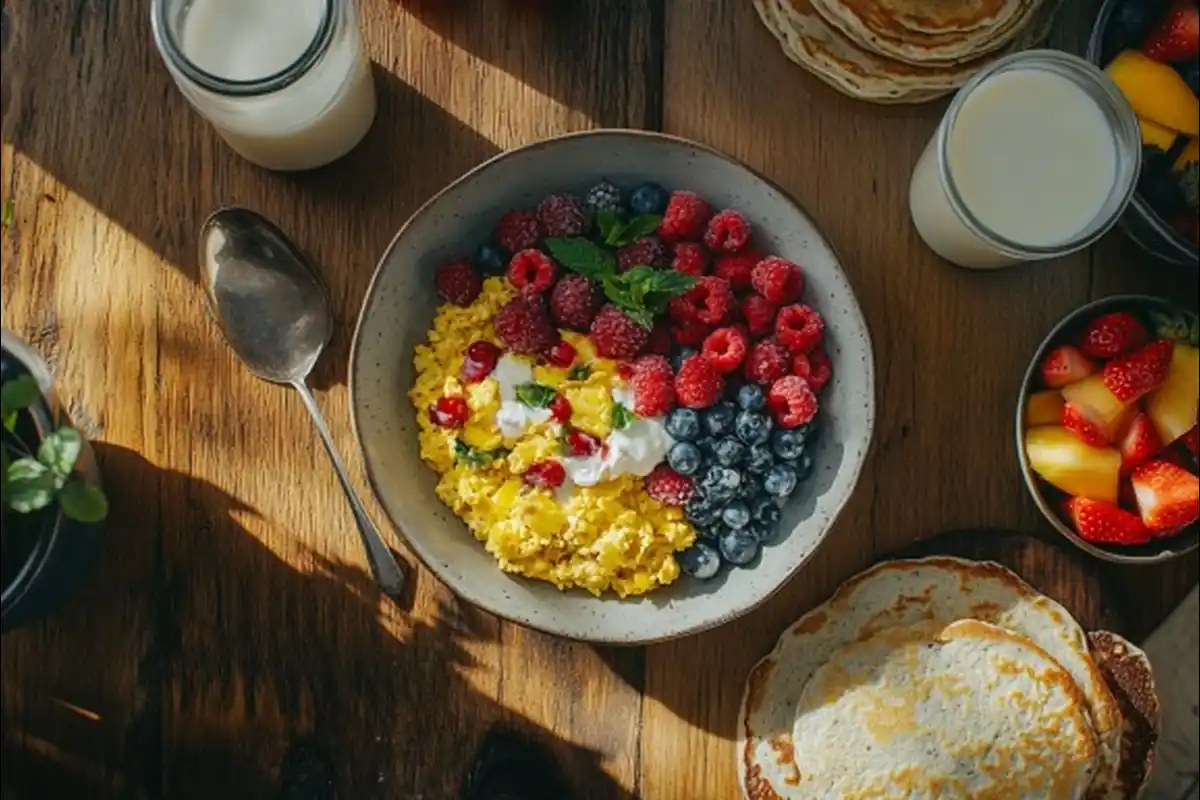What Can I Eat for Breakfast If I Can’t Have Dairy or Eggs? Starting your day with a delicious, nutritious breakfast can be challenging when you’re avoiding dairy and eggs. Whether due to allergies, intolerances, or dietary preferences, skipping these ingredients doesn’t mean sacrificing flavor or satisfaction. This guide will help you explore exciting, dairy- and egg-free breakfast ideas, recipes, and tips for a healthier morning routine.
1: Understanding the Challenges of a Dairy- and Egg-Free Diet
Breakfast without dairy or eggs can seem like a tall order, but it’s entirely doable! Let’s explore why these restrictions exist and the benefits they can bring to your plate.
Why Avoid Dairy and Eggs?
For many people, avoiding dairy and eggs isn’t just a preference—it’s a necessity. Allergies and intolerances to these ingredients are common, affecting millions worldwide. Dairy products can trigger symptoms like bloating, skin reactions, or even severe allergies due to lactose intolerance or casein sensitivity. Similarly, eggs might cause reactions ranging from mild discomfort to severe anaphylaxis.
Some individuals choose to skip dairy and eggs for ethical reasons or as part of a vegan diet. Whatever the reason, the key is finding creative and wholesome substitutes.
Health Benefits of a Dairy- and Egg-Free Breakfast
Skipping dairy and eggs doesn’t mean sacrificing nutrition. In fact, many people discover health perks when they switch to alternative ingredients:
- Reduced inflammation: Dairy can contribute to inflammation in some individuals. Removing it may help reduce bloating and other inflammatory symptoms.
- Improved digestion: Many people find their digestion improves when they ditch lactose and eggs.
- Nutritional diversity: A dairy- and egg-free diet encourages you to explore whole grains, legumes, fruits, and vegetables.
Overcoming Initial Challenges
It’s normal to feel a bit overwhelmed when changing your breakfast habits. But with some creativity and the right recipes, you’ll soon discover a variety of tasty options. This guide will show you how to build a breakfast that’s nutritious, delicious, and easy to prepare—all without dairy or eggs.
2: Top Ingredients for Breakfast When You Can’t Have Dairy or Eggs
Crafting a delicious breakfast without dairy or eggs starts with stocking the right ingredients. From nutrient-packed grains to healthy fats, here’s everything you need to create satisfying morning meals.
Best Grains and Cereals for Dairy- and Egg-Free Breakfasts
Grains are the cornerstone of many dairy- and egg-free breakfasts. They’re versatile, easy to prepare, and packed with energy.
- Oatmeal: A breakfast staple, oatmeal can be made with non-dairy milks like almond, oat, or coconut milk. Add fruits, nuts, and a drizzle of maple syrup for a hearty start.
- Quinoa and Buckwheat: These protein-rich options are excellent substitutes for traditional cereals and can be served sweet or savory.
- Gluten-Free Options: If you’re also avoiding gluten, opt for gluten-free granola or puffed rice cereals.
Plant-Based Proteins for Breakfast Without Dairy or Eggs
Protein is essential for a balanced breakfast. Thankfully, there are plenty of dairy- and egg-free options to keep you fueled.
- Tofu and Tempeh: Perfect for scrambles or as a meat substitute in breakfast wraps. Season with turmeric and nutritional yeast for a “cheesy” flavor.
- Legumes: Chickpeas and black beans can be turned into spreads or used in breakfast burritos.
- Nuts and Seeds: Almonds, chia seeds, and sunflower seeds add protein and healthy fats.
Fruits and Vegetables
Fresh produce is your best friend when going dairy- and egg-free.
- Fruits: Bananas, berries, and apples are naturally sweet and nutrient-rich. Use them in smoothies, toppings, or on-the-go snacks.
- Vegetables: Spinach, sweet potatoes, and avocados can be incorporated into scrambles, bowls, or as spreads on toast.
Healthy Fats
Healthy fats not only add flavor but also keep you feeling full longer.
- Avocados: Spread them on toast, blend into smoothies, or slice them for bowls.
- Coconut Products: Coconut oil and coconut cream work well in cooking and baking.
- Nut Butters: Almond and cashew butter are excellent toppings for toast and oatmeal.
3: Recipe Ideas: What Can I Eat for Breakfast If I Can’t Have Dairy or Eggs?
Now that your pantry is stocked, it’s time to get cooking. These recipes are quick, easy, and delicious—perfect for any morning.
Savory Recipes for Dairy- and Egg-Free Breakfasts

- Tofu Scramble with Vegetables
- Ingredients: Firm tofu, spinach, cherry tomatoes, turmeric, nutritional yeast, olive oil.
- Preparation: Sauté the tofu with vegetables and spices for a hearty, protein-packed dish.
- Sweet Potato Breakfast Hash
- Ingredients: Sweet potatoes, red peppers, onions, smoked paprika.
- Preparation: Roast the sweet potatoes, then combine with sautéed peppers and onions for a smoky flavor.
Sweet Breakfast Ideas Without Dairy or Eggs
- Banana and Coconut Smoothie Bowl
- Ingredients: Frozen bananas, coconut milk, chia seeds, granola.
- Preparation: Blend bananas with coconut milk, pour into a bowl, and top with seeds and granola.
- Dairy-Free Pancakes
- Ingredients: Flour (or gluten-free alternative), non-dairy milk, baking powder, maple syrup.
- Preparation: Mix ingredients, cook on a skillet, and top with berries or syrup.
Fast and Easy Breakfasts Without Eggs or Dairy
- Overnight Oats with Chia Seeds
- Ingredients: Rolled oats, almond milk, chia seeds, vanilla extract.
- Preparation: Mix ingredients in a jar and refrigerate overnight.
- Energy Balls with Dates and Almond Butter
- Ingredients: Dates, almond butter, oats, cocoa powder.
- Preparation: Blend ingredients, roll into balls, and refrigerate.
If you’re looking for more delicious dairy- and egg-free breakfast ideas, you might enjoy trying out this Banana Raisin Bread Recipe. It’s a great option for a satisfying morning treat!
4: How to Adapt Popular Breakfast Dishes
One of the joys of cooking is reinventing classic recipes to fit your dietary needs. If you’ve been wondering What Can I Eat for Breakfast If I Can’t Have Dairy or Eggs?, this section will teach you how to tweak traditional breakfast staples into dairy- and egg-free delights.
Making Dairy- and Egg-Free Versions of Classics
1. Pancakes and Waffles
- Traditional recipes often rely on eggs and milk, but substitutes work beautifully.
- Replace eggs with flaxseed meal (1 tablespoon flaxseed + 3 tablespoons water = 1 egg). Use almond, oat, or coconut milk instead of dairy milk.
- Pro Tip: Add a splash of vanilla extract for extra flavor.
2. Muffins and Baked Goods
- Use mashed bananas, applesauce, or aquafaba (chickpea water) as an egg substitute.
- Non-dairy yogurts, such as coconut or soy-based, can replace dairy yogurt for moisture.
- For sweetness, consider maple syrup or coconut sugar instead of refined sugar.
Substitutes to Use
Swapping out dairy and eggs in recipes is easier than you think with these simple substitutes:
- Plant-Based Milks: Almond, cashew, soy, or oat milk are fantastic replacements for dairy.
- Egg Substitutes: Try flaxseed meal, chia seeds, mashed bananas, or aquafaba for structure in baked goods.
- Dairy-Free Cheeses: Nutritional yeast or cashew cream can mimic cheese flavors in savory dishes.
For more recipe inspiration, explore these Gluten and Dairy-Free Breakfast Recipes for a unique twist on classic baked favorites.
5: Nutritional Considerations for Dairy- and Egg-Free Breakfasts
Eating dairy- and egg-free can still provide all the nutrients you need to stay energized throughout the day. A balanced breakfast is key, even when skipping traditional ingredients.
How to Ensure Adequate Protein Intake
Protein is often associated with eggs, but there are plenty of plant-based sources:
- Legumes and Beans: Black beans or chickpeas are great in savory breakfast bowls or spreads like hummus.
- Tofu and Tempeh: These soy-based proteins can mimic scrambled eggs or sausage patties.
- Nuts and Seeds: Almonds, sunflower seeds, and chia seeds are protein-rich and easy to add to smoothies or oatmeal.
Pro Tip: Combine multiple protein sources, like nut butter on whole-grain toast, for a complete amino acid profile.
Essential Vitamins and Minerals
Skipping dairy and eggs doesn’t mean missing out on key nutrients if you make mindful choices:
- Calcium and Vitamin D: Fortified plant milks, leafy greens, and supplements help meet daily needs.
- Vitamin B12: Found in nutritional yeast and fortified cereals, B12 is crucial for energy and focus.
- Iron: Include spinach, lentils, and tofu to boost iron levels. Pair with vitamin C-rich foods like oranges for better absorption.
For more tips on balancing nutrients in your meals, check out our Pumpkin Pie Recipe, which can easily be adapted for dairy-free diets.
6: FAQs
What to Eat for Breakfast When You Can’t Eat Eggs or Dairy?
When faced with the question, What Can I Eat for Breakfast If I Can’t Have Dairy or Eggs?, the options are plentiful. From hearty oatmeal topped with nuts and fruits to protein-packed tofu scrambles, you can enjoy a variety of filling meals. Smoothies made with almond milk, chia seeds, and fresh fruits also make a quick and healthy choice. Experimenting with plant-based recipes opens the door to exciting flavors.
What Diet Excludes Both Eggs and Dairy?
A vegan diet eliminates all animal products, including eggs and dairy. People with food allergies or intolerances may also avoid these ingredients. Gluten-free diets may overlap with dairy- and egg-free preferences if someone needs to avoid multiple allergens. Following these diets involves substituting traditional ingredients with plant-based alternatives to ensure balanced nutrition.
How Can I Get Protein for Breakfast Without Eggs or Dairy?
Protein is essential to keep you energized all day. You can get plenty of it from sources like tofu, tempeh, nuts, seeds, and legumes. For example, a slice of whole-grain toast with almond butter or a smoothie with chia seeds and plant protein powder offers a protein-rich start.
Can Someone with a Dairy Allergy Eat Eggs?
Yes, eggs are not considered dairy. However, if you are avoiding both due to dietary restrictions or preferences, there are countless substitutes available, as discussed earlier in this article. Use aquafaba, flaxseeds, or mashed bananas in recipes that call for eggs.
7: Easy Dairy- and Egg-Free Recipes: What to Eat for Breakfast
Let’s dive into some delicious recipes that answer the pressing question, What Can I Eat for Breakfast If I Can’t Have Dairy or Eggs?. These recipes are simple, nutrient-rich, and sure to brighten your mornings.
Recipe 1: Savory Tofu and Spinach Breakfast Without Dairy or Eggs
Ingredients:
- 1 block firm tofu
- 1 cup spinach
- 1/2 teaspoon turmeric
- 1 tablespoon nutritional yeast
- Olive oil, salt, and pepper to taste
Preparation:
- Crumble the tofu into a skillet with olive oil.
- Add turmeric, nutritional yeast, salt, and pepper, stirring until evenly coated.
- Toss in spinach and sauté until wilted. Serve warm.
2: Sweet Breakfast Bowl with Quinoa, Almond Butter, and Berries

Ingredients:
- 1 cup cooked quinoa
- 1 tablespoon almond butter
- 1/2 cup mixed berries
- 1 tablespoon chia seeds
Preparation:
- Place cooked quinoa in a bowl.
- Drizzle with almond butter and top with berries and chia seeds.
- Add a splash of non-dairy milk for a creamy texture.
Recipe 3: Gluten-Free and Dairy-Free Muffins
Ingredients:
- 2 cups gluten-free flour
- 1/2 cup coconut sugar
- 1 tablespoon flaxseed meal + 3 tablespoons water
- 1 cup almond milk
- 1/2 cup coconut oil
Preparation:
- Preheat oven to 350°F (175°C). Mix flaxseed meal with water and let sit for 5 minutes.
- Combine all ingredients and stir until smooth.
- Pour into muffin tins and bake for 20–25 minutes.
With these recipes, you’ll never have to wonder, What Can I Eat for Breakfast If I Can’t Have Dairy or Eggs? again. From savory to sweet, these options are proof that a restricted diet can be full of flavor and creativity.
8: Final Thoughts and Encouragement
Eating a delicious, satisfying breakfast without dairy or eggs may feel daunting at first, but it’s entirely achievable—and even enjoyable—with the right mindset and resources. Here’s how to embrace this lifestyle with confidence.
Embracing a Dairy- and Egg-Free Breakfast Lifestyle
If you’ve ever wondered, What Can I Eat for Breakfast If I Can’t Have Dairy or Eggs?, remember that the possibilities are nearly endless. From plant-based proteins to flavorful grains and fruits, there’s no shortage of tasty options. The key is to experiment with new ingredients and find combinations you genuinely enjoy.
Start by incorporating one or two new recipes into your weekly routine. You’ll quickly build a repertoire of go-to meals that are both nourishing and satisfying. Remember, even small changes can have a big impact on your health and well-being.
Experimenting with New Ingredients and Recipes
One of the most exciting aspects of going dairy- and egg-free is discovering new ingredients. Nutritional yeast, aquafaba, and plant-based milks are just a few of the game-changers that can transform your breakfast. Don’t be afraid to get creative—play around with flavors, textures, and spices to make each meal uniquely yours.
For additional recipe inspiration, visit trusted sources like food blogs or websites. Many offer detailed guides on how to adapt classic dishes, ensuring that you never feel limited by dietary restrictions.
9: Bonus Tips for Long-Term Success
To help you fully embrace the question, What Can I Eat for Breakfast If I Can’t Have Dairy or Eggs?, here are some tips to make your transition smoother and more enjoyable.
Stock Your Pantry with Essentials
A well-stocked pantry is your secret weapon for dairy- and egg-free breakfasts. Keep staples like oats, chia seeds, tofu, nut butters, and plant-based milks on hand. Having these ingredients ready ensures you’re always prepared to whip up a quick and healthy meal.
Plan Ahead for Busy Mornings
Mornings can be hectic, so planning ahead is key. Meal prep your breakfasts the night before by making overnight oats, smoothie bags, or pre-cooked quinoa bowls. This not only saves time but also removes any guesswork about what to eat.
Stay Inspired with New Recipes
Prevent breakfast boredom by regularly trying new recipes. Whether it’s experimenting with a tofu scramble or baking a fresh batch of gluten-free muffins, staying curious keeps meals exciting. For more ideas, check out recipes like our Banana Raisin Bread Recipe, which can be adapted for dairy- and egg-free diets.
By following these tips and incorporating the recipes shared in this guide, you’ll never have to ask, What Can I Eat for Breakfast If I Can’t Have Dairy or Eggs? again. Your breakfast routine will be filled with vibrant, delicious meals that support your dietary needs and start your day on a high note.


3 thoughts on “What Can I Eat for Breakfast If I Can’t Have Dairy or Eggs?”